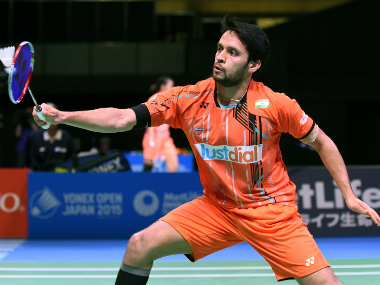India’s singles badminton player Parupalli Kashyap, who recently made a comeback from a shoulder injury, had an agonising opening day when he was forced to play two matches within 12 hours at the Thailand Grand Prix Gold tournament in Bangkok. Kashyap won his first-round match against Slovakia’s Milan Dratva, with his match finishing at 2:00 am local time. The second-round match, against second seed Marc Zwiebler of Germany, was scheduled for 12 noon on the next day, within a space of just 10 hours. Irked by the cramped schedule, Kashyap took to Twitter to voice his frustration.
Ridiculous scheduling and refereeing . First round at 12/1 am and second round at 12pm . #thailandGPG @bwfmedia Stupidity! @bwf_ac
— Kashyap Parupalli (@parupallik) May 30, 2017
Despite the hectic schedule, the Hyderabad-born shuttler managed to eke out a straight-game win over his opponent.
Finally the end of round 1! Round 2 in 12hrs!!! #thailandgpg
— Kashyap Parupalli (@parupallik) May 30, 2017
“It (hectic scheduling) happens very rarely but at the qualifying rounds at the Super Series events, it happens all the time. The delay was not the issue, delays happen very often because sometimes there are too many matches which extend longer than scheduled,” Kashyap told Firstpost. The Badminton World Federation’s (BWF) scheduling of matches can sometimes turn out to be too unreasonable for the shuttlers. [caption id=“attachment_3048982” align=“alignleft” width=“380”] File image of Parupalli Kashyap. AFP[/caption] “The issue was that the matches got delayed and the match that I was supposed to play at 9:30 pm, I ended up playing at 2:00 am. Before the schedule came out, I informed the referee about it and requested him to put my second round after 4 or 5 pm on the next day so that I can rest adequately as my match got delayed a lot.” “But instead of saying ‘okay’, he (referee) said he can’t guarantee it and that he could only schedule it post 11:30 am and finally it became 11:55 am. We again complained once the schedule was out and then he pushed it to 2:55 pm,” the 30-year-old shuttler explained. The 2014 Commonwealth gold medallist felt that he did not get enough time to recover as by the time he returned to his hotel, it was already 4:00 am. “So, my tweet was just for them to understand that there should be some consideration as to which players played late and schedule their match accordingly later for the next round,” he said. It is a no-brainer that athletes, especially in racquet sports, require ample rest and a cool-off period before they fully recover for their next match. Shuttlers put in a lot of effort in this sport to cover the court, and their lunges and aerial movements puts a lot of stress on their bodies. There is always a possibility of getting injured in the process. Eventually, Kashyap ended his Thailand Open campaign after a 14-21, 18-21 loss to Zwiebler in the second round. “It should not be that just because I voiced my opinion, they change my match, and the others who don’t know that they can even do something about it, are left to play early.” “I can still agree to it if my opponent and I are given the same situation. But if my opponent finishes at 7:30 pm and I finish at 2 am, and then we play a match at 2:00 pm next day that’s totally unfair,” he added. “I have discussed it with the referee and the BWF organisers and they tried to sort the situation,” said Kashyap. This is not the first time that Indian shuttlers have faced scheduling issues in tournaments. Since January 2017, all the top Indian shuttlers have been involved in multiple tournaments starting from the Premier Badminton League, Syed Modi International followed by All England Open and India Open. There is barely any time for these athletes to take rest. During the London Olympics in 2012, Jwala Gutta too was irked by the poor scheduling as she went on to play two matches on a single day. Singapore Open winner B Sai Praneeth also played a late match against Lee Chong Wei at the 2016 All England Open. Before the start of the India Open earlier this year, Olympic gold medallist Carolina Marin too stressed on the fact that cramped schedule makes shuttlers prone to injuries and that there should be some rearrangements. “BWF should think about that (sorting the international calendar) because the top players always have to play some sort of tournament. But we are human, we are players, so we sometimes need a break,” Marin said when asked if BWF should re-look at the international calendar,” said the Spaniard. “We never get a break, we always have so many tournaments in a row during the year. When we have World Championship or Olympics Games, we again have to come back and play at Japan or Korea Open, so we never have a long break and I think our body needs it,” she added. It is difficult for the shuttlers to adapt and be ready for games especially the ones who are vying a comeback on the court after a lengthy recovery. In an exclusive interview with Firstpost , former World No 2 Saina Nehwal explained how shuttlers have no other option but to play back-to-back tournaments. “Now we are used to playing so many tournaments in a year. In badminton and in tennis you have to play 20-25 tournaments in a year. But, at the same time, when you come out of a major injury, it takes a little time for you to be back to your best.”


)

)
)
)
)
)
)
)
)



